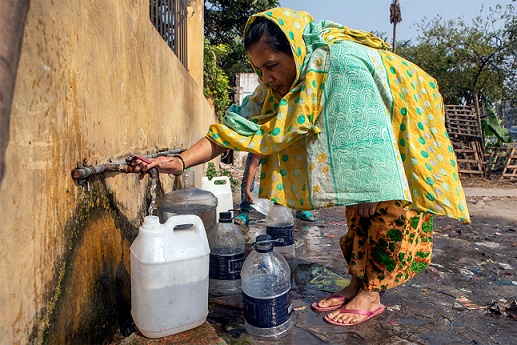-During the dry seasons, water flow of 3 main rivers of country decreases by 113 cubic meters per yr
-Groundwater level is decreasing to 0.94 m in areas required for irrigation
"The water level is going down fast, if it continues, it will be a death knell for our country's agriculture."
Dr. Md Abdul Baten, Professor, BAU
Bangladesh's water reserves and water levels are rapidly decreasing. A recent report says water reserves are decreasing by 200 million cubic meters every year in the country's borders. And annual rainfall in the country is decreasing by 10 millimeters. During the dry season, the water flow of the country's three main rivers decreases by 113 cubic meters per year, which has a major impact on the irrigation system in the country's agricultural sector.
The water shortage for agriculture in the northern part of the country is increasing day by day. Due to the non-availability of irrigation water in rivers and reservoirs, taking the help of underground water is also in great danger. The groundwater level in the area required for annual irrigation is decreasing to 0.94 meters. Recently, a scientific article published in the international science journal Nature has highlighted such information about the latest water situation in Bangladesh. Experts said if such a disaster occurs in the water supply, the agricultural system in the northwest of the country will be in a state of death.
In the beginning of that article of Nature, the agricultural situation of Bangladesh is highlighted, and it is said that Bangladesh is one of the fastest-growing economies in the world. The total local production there has increased almost 8 times from 2000 to 2022. The government has modernized the agricultural system to promote food security. However, this progress of agriculture is hindered by the lack of an adequate irrigation system. As a result, the farmers of the country are now being encouraged to cultivate rice not only in the rainy season (June-October) but also in the dry season. Aiming at that, the discovery of other crop varieties including rice is also being looked at. As a result, rice productivity has doubled compared to 1990 (per hectare). Now Bangladesh produces 4.8 tonnes of rice per hectare annually.
The article pointed out that 73 percent of the water used for irrigation in the dry season in Bangladesh now comes from underground sources. At the same time, in neighboring India, large amounts of groundwater are extracted for agriculture. Due to the upstream location of Bangladesh from India, the groundwater flow within the country is also deficient.
According to Nature data, an analysis of satellite data for Bangladesh showed that since 2002, groundwater supplies (pools of water from rivers, lakes, wetlands, soil moisture, groundwater and other aquifers) have decreased by 37.5 billion cubic meters across the country. Most of this loss is due to groundwater depletion. Since 2000, inundation has been decreasing by 1 meter every year in some places including the North-West of the country and Dhaka.
Md Abdul Baten, Professor of Environmental Science of Bangladesh Agricultural University said that the way water is in crisis in our country, the water level is falling rapidly, if it continues, it will be a death knell for our country's agriculture. It will be very bad. The way the intense heatwave has swept this time, it can be assumed that there will be a lot of rain. The weather forecast says the same. If so, the groundwater depletion will be reduced to some extent and help to alleviate water scarcity.
Md Mojibur Rahman, Member Director (Small Irrigation) of Bangladesh Agricultural Development Corporation said, 'We are trying hard to meet the irrigation needs. We are looking for new agricultural land in places where there will be less demand for irrigation. Along with this, emphasis is being placed on the production of crops that require less water. Still, as water scarcity is increasing, groundwater levels are falling, so various steps are being taken to increase irrigation capacity. However, another big problem is that the amount of water extracted from underground for irrigation or other purposes, the rate of recharge or vacuum is not filled or is relatively low.
Meanwhile, Palli Bidyut Samity under Bangladesh Rural Electrification Board (BREB) has issued a new circular to facilitate the irrigation system ahead of this year's irrigation season. It has been stated that there will be no separate irrigation season for electric irrigation operations. Electrical irrigation will be operated throughout the year for the sake of local requirements. All applicants for year-round irrigation connections should be provided with expedited connection arrangements.
According to the circular, besides the production of Aush, Aman, and Boro rice, all types of agriculture will be covered under irrigation for the production of onion, garlic, dal, oil crops, turmeric, ginger, vegetables, seasonal flowers, and fruits. All irrigation applicants must be connected under the current irrigation policy. Irrigation connections cannot be shut down on the pretext of overloading of sub-stations of societies and 33 KV and 11 KV feeders. If laxity is proved in this regard, administrative disciplinary action will be taken against those responsible.
ZH






